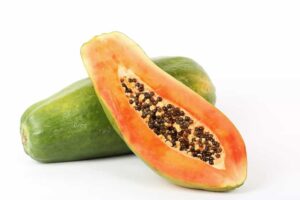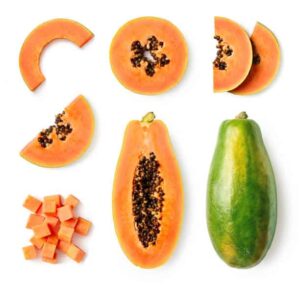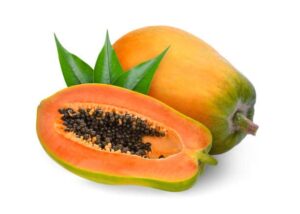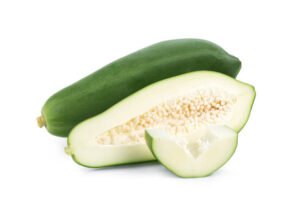Papaya, scientifically known as Carica papaya, is a tropical fruit celebrated for its delicious taste and numerous health benefits. Native to Central and South America, papaya has gained worldwide popularity due to its rich nutrient profile and potential positive effects on health. Papaya benefits are further examined in this article, delving into the scientifically-backed advantages of consuming this tropical fruit and highlighting its role in promoting overall well-being.
Rich in Nutrients and Antioxidants
Papayas are a nutritional powerhouse, packed with essential vitamins, minerals, and antioxidants. One cup of papaya cubes contains over 100% of the recommended daily intake of vitamin C, which helps boost the immune system and supports skin health. Additionally, papaya is a good source of vitamin A, vitamin E, and folate, all crucial for various bodily functions.
Loaded with carotenoids, such as beta-carotene, lutein, and zeaxanthin, papayas contribute to eye health and may reduce the risk of age-related macular degeneration. Furthermore, the enzyme papain, unique to papayas, not only aids digestion but also possesses anti-inflammatory properties, adding an extra layer to the fruit’s antioxidant prowess. The dynamic combination of vitamins and distinct antioxidants in papayas makes them a standout choice for supporting overall health and well-being.
- Reference: Ovando-Martínez et al., “Vitamin C and Other Functional Compounds in Two Varieties of Carica papaya L. from Brazil,” Food Chemistry (2010).
Digestive Health
Papaya contains an enzyme called papain, which aids in the digestion of proteins. This enzyme is commonly used as a meat tenderizer and is also found in digestive enzyme supplements.
Their natural enzymes, including chymopapain and caricain, support the breakdown of dietary fibers and fats, ensuring thorough digestion. The presence of vitamins A and C in papayas contributes to a healthy digestive lining, reducing inflammation and fostering an environment conducive to nutrient absorption. Embracing papayas in your diet not only eases immediate digestive concerns but also promotes long-term gut health.
- Reference: Moneret-Vautrin et al., “Oral Allergy Syndrome and Digestive Allergy to Papaya,” Allergie et Immunologie (1992).
Anti-Inflammatory Properties
 The presence of various antioxidants, such as beta-carotene, lutein, and zeaxanthin, in papaya contributes to its anti-inflammatory effects. These compounds help reduce inflammation in the body, potentially lowering the risk of chronic diseases.
The presence of various antioxidants, such as beta-carotene, lutein, and zeaxanthin, in papaya contributes to its anti-inflammatory effects. These compounds help reduce inflammation in the body, potentially lowering the risk of chronic diseases.
Furthermore, the high vitamin C content in papayas contributes to their anti-inflammatory prowess. Vitamin C acts as a powerful antioxidant, neutralizing free radicals and curbing inflammation. This dual mechanism, coupled with the fruit’s rich phytonutrient profile, positions papayas as a flavorful and effective addition to an anti-inflammatory diet.
- Reference: Khoo et al., “Carotenoids and Their Isomers: Color Pigments in Fruits and Vegetables,” Molecules (2011).
Heart Health
Regular consumption of papaya may be beneficial for heart health. The fruit is rich in fiber, which can help lower cholesterol levels. Furthermore, the antioxidants and vitamins in papaya may reduce the risk of heart disease by preventing oxidative damage to the heart and blood vessels.
Additionally, the potassium content in papayas plays a vital role in maintaining healthy blood pressure levels, further enhancing their overall cardiovascular benefits.
- Reference: Afroz et al., “Papaya (Carica papaya L.) Fruit Juice Improves Cardiovascular Health in Adult Women,” Journal of Medicinal Food (2012).
Skin Health
 The high vitamin C content in papaya promotes collagen production, which is essential for maintaining skin elasticity and preventing wrinkles. Papaya’s antioxidants also protect the skin from damage caused by UV radiation.
The high vitamin C content in papaya promotes collagen production, which is essential for maintaining skin elasticity and preventing wrinkles. Papaya’s antioxidants also protect the skin from damage caused by UV radiation.
Furthermore, papayas contain an enzyme called papain, aiding in gentle exfoliation, removing dead skin cells, and promoting a radiant complexion. The hydrating properties of papayas, coupled with their vitamins and minerals, contribute to a rejuvenated and nourished skin, making them a holistic choice for a vibrant and healthy complexion.
- Reference: Pullar et al., “The Roles of Vitamin C in Skin Health,” Nutrients (2017).
Cancer Prevention
Some studies suggest that papaya’s rich antioxidant content may have a protective effect against certain types of cancer. The antioxidants in papaya help neutralize harmful free radicals that can damage DNA and lead to cancer development.
Furthermore, papayas are a notable source of an enzyme called papain, which may contribute to the breakdown of proteins and potentially inhibit the growth of cancer cells. Additionally, the high fiber content in papayas supports digestive health, further enhancing their potential role in preventing gastrointestinal cancers. The unique combination of antioxidants and enzymes in papayas highlights their multifaceted approach to cancer prevention.
- Reference: Pandey et al., “Carotenoids and Antioxidant Properties of Carica papaya Flesh and Seeds at Different Maturity Stages,” Plant Foods for Human Nutrition (2010).
Supports Immune System
 Papaya’s high vitamin C content is well-known for its immune-boosting properties. Vitamin C plays a crucial role in supporting the immune system by enhancing the production of white blood cells and promoting the body’s defense against infections and illnesses.
Papaya’s high vitamin C content is well-known for its immune-boosting properties. Vitamin C plays a crucial role in supporting the immune system by enhancing the production of white blood cells and promoting the body’s defense against infections and illnesses.
Papayas, with their immune-boosting prowess, stand out for their unique attributes. Beyond vitamin C, they offer a rich array of antioxidants, such as beta-carotene, which further fortify the body’s defenses. The enzymatic content in papayas, notably papain, adds an extra layer of support, aiding in digestion and overall immune resilience.
- Reference: Carr and Maggini, “Vitamin C and Immune Function,” Nutrients (2017).
Aid in Weight Management
Including papaya in your diet can be a smart move for those aiming to manage their weight. It’s low in calories and contains a good amount of dietary fiber, which can help you feel fuller for longer, reducing overall calorie intake.
Moreover, papayas are rich in enzymes like papain, which supports efficient digestion and nutrient absorption. The combination of low-calorie content, high fiber, and digestive enzymes makes papayas not only a weight-friendly choice but also a digestive powerhouse, promoting overall digestive health.
- Reference: Dreher and Davenport, “Hass Avocado Composition and Potential Health Effects,” Critical Reviews in Food Science and Nutrition (2013).
Eye Health
Papayas, rich in lutein and zeaxanthin, stand out for their exceptional contributions to eye health. These antioxidants, uniquely concentrated in papayas, not only safeguard against age-related macular degeneration but also promote optimal vision by enhancing visual acuity. The vibrant orange hue of papayas indicates the presence of beta-carotene, another eye-friendly compound, making these tropical fruits a flavorful and visually beneficial addition to your diet.
- Reference: Ma et al., “Lutein and Zeaxanthin in the Eyes, Serum and Diet of Human Subjects,” Experimental Eye Research (2006).
A Natural Anti-Stress Fruit
 Papaya contains a significant amount of vitamin C and other nutrients that help combat stress. These nutrients play a vital role in regulating the release of stress hormones and promoting relaxation.
Papaya contains a significant amount of vitamin C and other nutrients that help combat stress. These nutrients play a vital role in regulating the release of stress hormones and promoting relaxation.
Papayas stand out as a natural anti-stress fruit due to their rich enzymatic content, including papain and chymopapain, which aid in digestion and contribute to a calmer digestive system.
Additionally, the presence of folate in papayas further supports mental well-being, making these tropical delights a holistic remedy for stress management. The combination of these distinctive attributes positions papayas as not only a delicious tropical treat but also as a nurturing ally in promoting both physical and mental relaxation.
- Reference: Brody et al., “A Randomized Controlled Trial of High Dose Ascorbic Acid for Reduction of Blood Pressure, Cortisol, and Subjective Responses to Psychological Stress,” Psychopharmacology (1999).
Bone Health
Papaya is a source of vitamin K, which is essential for bone health as it helps in calcium absorption and bone mineralization. Adequate vitamin K intake can contribute to strong and healthy bones.
Moreover, papayas contain trace elements like magnesium and copper, complementing the role of vitamin K in bone health. Magnesium enhances bone density, while copper contributes to the formation of collagen, a key component of bone structure.
- Reference: Booth et al., “Vitamin K Intake and Bone Mineral Density in Women and Men,” The American Journal of Clinical Nutrition (2003).
Natural Skin Exfoliation
The enzyme papain in papaya also serves as an excellent natural exfoliant for the skin. Papain helps remove dead skin cells and can be used topically to improve skin texture and promote a glowing complexion.
- Reference: Mohammed and Ahmed, “Studies on Papain-Catalyzed Hydrolysis of Natural Rubber,” Journal of Applied Polymer Science (2000).
Supports Diabetes Management
Some studies suggest that papaya may be beneficial for individuals with diabetes. The fiber content in papaya can help regulate blood sugar levels by slowing down the absorption of sugar in the bloodstream. Additionally, the antioxidants in papaya may reduce oxidative stress, which is a factor in diabetes-related complications.
Furthermore, the unique composition of papayas extends beyond fiber and antioxidants. They boast a low glycemic index, making them a favorable choice for individuals with diabetes as they are less likely to cause rapid spikes in blood sugar levels.
Additionally, the wealth of vitamins and minerals, such as vitamin C, folate, and potassium, in papayas further contributes to their role in supporting diabetes management by enhancing overall metabolic health and providing essential nutrients.
- Reference: Oboh et al., “Inhibition of Key Enzymes Linked to Type 2 Diabetes and Sodium Nitroprusside-Induced Lipid Peroxidation in Rats’ Pancreas by Water Extractable Phytochemicals from Some Tropical Vegetables,” Journal of Basic and Clinical Physiology and Pharmacology (2013).
Anti-Aging Properties
The antioxidants and vitamins in papaya, including vitamin C and E, can help combat the signs of aging. They protect the skin from oxidative stress, reduce the appearance of wrinkles, and promote a youthful complexion.
Furthermore, papayas, rich in antioxidants, contribute to collagen production, enhancing skin elasticity. Their high water content also ensures optimal hydration, vital for maintaining skin suppleness.
- Reference: Rinnerthaler et al., “Oxidative Stress in Aging Human Skin,” Biomolecules (2015).
Wound Healing
Topical application of papaya extracts or puree has been used traditionally to aid in wound healing. The enzymes in papaya, including papain, have mild antiseptic and anti-inflammatory properties that can help cleanse and speed up the healing process of minor cuts, burns, and other skin injuries.
- Reference: Nayak et al., “Evaluation of Wound Healing Activity of Papaya (Carica papaya Linn.) Seed in Albino Rats,” Journal of Natural Remedies (2010).
Supports Healthy Hair
Papaya contains vitamin A, a nutrient crucial for the production of sebum, the natural oil that keeps hair and scalp moisturized. Consuming papaya may contribute to healthier hair and a reduction in issues like dandruff and dryness.
Papayas are also rich in vitamin C, promoting collagen production that strengthens hair strands and prevents breakage. Additionally, the enzyme papain aids in the removal of impurities, supporting a clean and healthy scalp.
- Reference: Hughes et al., “Dietary Carotenoids and Human in Vivo Immune Function in Healthy Volunteers,” European Journal of Clinical Nutrition (2002).
Enhanced Pregnancy Health:
For expectant mothers, papaya can be a valuable addition to their diet. It’s rich in folate (vitamin B9), which is essential for fetal development. Adequate folate intake during pregnancy reduces the risk of neural tube defects in newborns.
- Reference: Czeizel and Dudas, “Prevention of the First Occurrence of Neural-Tube Defects by Periconceptional Vitamin Supplementation,” New England Journal of Medicine (1992).
Nutritional Value of Papaya (per 100 grams):
- Calories: 43 kcal
- Protein: 0.5 grams
- Carbohydrates: 11 grams
- Dietary Fiber: 1.7 grams
- Sugars: 9 grams
- Fat: 0.3 grams
- Vitamins:
- Vitamin A: 950 IU (providing 32% of the recommended daily intake)
- Vitamin C: 60.9 mg (providing 101% of the recommended daily intake)
- Vitamin E: 0.3 mg (providing 2% of the recommended daily intake)
- Vitamin K: 2.6 mcg (providing 3% of the recommended daily intake)
- Folate (Vitamin B9): 37 mcg (providing 9% of the recommended daily intake)
- Minerals:
- Potassium: 182 mg (providing 5% of the recommended daily intake)
- Calcium: 20 mg (providing 2% of the recommended daily intake)
- Magnesium: 21 mg (providing 5% of the recommended daily intake)
- Phosphorus: 10 mg (providing 1% of the recommended daily intake)
- Iron: 0.25 mg (providing 1% of the recommended daily intake)
- Other Nutrients:
- Beta-Carotene: 2761 µg
- Lutein and Zeaxanthin: 89 µg
- Papain (enzyme): Variable, depending on ripeness
Note:
- Papaya is low in calories, making it a healthy option for those watching their calorie intake.
- It is a rich source of vitamin C, providing over 100% of the recommended daily intake, which is important for immune support and skin health.
- The fruit contains vitamin A in the form of beta-carotene, which is essential for eye health and overall well-being.
- Papaya also offers a good amount of dietary fiber, aiding in digestion and contributing to a feeling of fullness.
- The enzyme papain, found in varying amounts depending on ripeness, supports digestion and is often used as a meat tenderizer.
- It is relatively low in fat, making it a heart-healthy option.
- Papaya is a moderate source of potassium, an essential mineral for regulating blood pressure and fluid balance.
Keep in mind that the nutritional content may vary slightly depending on the ripeness and variety of papaya. Nonetheless, it’s a nutritious fruit that can be a valuable addition to your diet.
Conclusion
Papaya is more than just a delicious tropical fruit; it’s a nutrient-dense powerhouse that offers numerous health benefits supported by scientific research. From promoting digestive health to reducing inflammation and supporting heart and skin health, incorporating papaya into your diet can be a tasty way to enhance your overall well-being. Remember to enjoy this nutritious fruit in moderation as part of a balanced diet to reap its full advantages.
 Get ready to embark on a flavorful culinary journey with Jamie Oliver’s “Prawn and Papaya Salad.” This delightful dish combines the succulent goodness of prawns with the refreshing, tropical taste of papaya, creating a vibrant and healthy salad that’s perfect for any occasion. Bursting with colorful ingredients and a harmonious blend of flavors, this recipe is a testament to Jamie’s passion for fresh, seasonal produce and his commitment to creating dishes that are not only delicious but also nutritious.
Get ready to embark on a flavorful culinary journey with Jamie Oliver’s “Prawn and Papaya Salad.” This delightful dish combines the succulent goodness of prawns with the refreshing, tropical taste of papaya, creating a vibrant and healthy salad that’s perfect for any occasion. Bursting with colorful ingredients and a harmonious blend of flavors, this recipe is a testament to Jamie’s passion for fresh, seasonal produce and his commitment to creating dishes that are not only delicious but also nutritious.
Contraindications or precautions to consider when consuming papaya:
1. Allergic Reactions:
Some individuals may be allergic to papaya. Allergic reactions can range from mild symptoms like itching and hives to severe reactions like difficulty breathing or anaphylaxis. If you suspect an allergy to papaya, it’s essential to seek medical attention immediately.
2. Gastrointestinal Upset:
While papaya is generally considered beneficial for digestion, consuming it in excessive amounts may lead to gastrointestinal discomfort, such as diarrhea or upset stomach, due to its enzyme content, particularly papain.
3. Interference with Medications:
Papaya may interact with certain medications. For example, the enzyme papain in papaya can interfere with blood-thinning medications like warfarin, potentially affecting blood clotting. If you are taking medication, consult with your healthcare provider before significantly increasing your papaya consumption.
4. Latex Allergy Cross-Reactivity:
Some individuals with latex allergies may experience cross-reactivity with certain fruits, including papaya. This cross-reactivity can lead to allergic symptoms. If you have a latex allergy, be cautious when consuming papaya and monitor for any adverse reactions.
5. Unripe Papaya During Pregnancy:
Unripe papaya contains higher levels of latex and papain, which are not recommended for pregnant women as they could potentially stimulate contractions and lead to preterm labor. Ripe papaya is generally considered safe during pregnancy when consumed in moderation.
6. Kidney Stones:
Papaya is a source of oxalates, which can contribute to the formation of kidney stones in individuals susceptible to this condition. If you have a history of kidney stones, it may be wise to limit your intake of foods high in oxalates, including papaya.
7. Interference with Iron Absorption:
The high vitamin C content in papaya can enhance non-heme iron absorption, which is the type of iron found in plant-based foods. While this is generally considered a benefit, individuals with hemochromatosis (a condition of excessive iron absorption) should be cautious with excessive vitamin C intake, including from papaya.
It’s crucial to consume papaya in moderation and be aware of any potential allergies or adverse reactions. If you have specific health concerns or conditions, consult with a healthcare professional before making significant changes to your diet, including the introduction of new foods like papaya.
Fascinating Facts About Papayas
Digestive Dynamo:
Papayas boast the magical touch of papain, an enzyme that aids digestion by breaking down proteins. It’s like having a digestive superhero in your fruit basket, ensuring a smooth journey through your digestive system.
Ethylene Emissaries:
Papayas moonlight as natural ripening agents. Emitting ethylene gas, they can accelerate the ripening of neighboring fruits. Consider them the tropical maestros orchestrating a fruity symphony in your kitchen.
Collagen Conjurers:
Bursting with vitamin C, papayas are silent architects of radiant skin. The vitamin stimulates collagen production, bestowing elasticity upon the skin and turning papayas into a fruity elixir for a youthful glow.
Spicy Seed Secrets:
Papaya seeds, often overlooked, pack a surprising punch of peppery goodness. Ground into a seasoning, they add an unexpected zing to culinary creations, proving that even seeds hold hidden treasures.
Hydration Haven:
Papayas, with their high water content, double as a hydrating oasis. The infusion of water and essential vitamins makes papayas a tropical elixir, quenching your thirst while nourishing your skin and overall well-being.
Columbus’ Celestial Discovery:
Christopher Columbus dubbed papayas the “fruit of angels” for a reason. Rich in nutrients and heavenly in flavor, papayas offer a taste of paradise that transcends the ordinary, earning their celestial title.
Pearly Whites Potion:
The papain enzyme isn’t just a digestive ally; it moonlights as a natural teeth whitener. Consider papayas your secret weapon for maintaining a radiant smile while relishing the tropical bliss
Papain’s Culinary Magic:
Papayas harbor papain, an enzyme not only aiding digestion but also serving as a unique culinary companion. Papain works as a natural meat tenderizer, offering a quirky twist to your kitchen adventures.
Papayas: Nature’s Botox?
Rich in enzymes and vitamins, papayas contribute to skin elasticity and may offer anti-aging benefits. The fruit’s potential to enhance skin suppleness remains a lesser-known gem in the realm of natural skincare.
Papayas as a Meatless Marinade:
Embrace papayas as a surprising ally in vegetarian marinades. Papain’s protein-breaking prowess makes papaya a natural choice for marinating plant-based proteins, infusing them with flavor and tenderness.
Tropical Sunscreen:
The beta-carotene content in papayas acts as a natural defense against UV rays. While it doesn’t replace traditional sunscreen, incorporating papayas into your diet may provide an added layer of sun protection from within.
Seeds with a Kick:
Papaya seeds, often discarded, boast a peppery flavor profile. Ground into a spice, they introduce a unique and unexpected element to dishes, showcasing the versatile nature of this often-overlooked component.
Papayas and the Circle of Life:
Papayas are prolific in their reproductive cycle. A single tree can produce fruits year-round, displaying a continuous and abundant life cycle that adds to the mystique of this tropical wonder.
Fruit of the Sunset:
Papayas exhibit a fascinating color transformation during ripening, evolving from green to shades of orange and yellow. This natural metamorphosis serves as a visual spectacle, earning papayas the title of the “fruit of the sunset.”
To explore more plants, please visit our page about plants
See the benefits for: Hair , Skin , Heart , Bones , Liver , Brain , Eyes , Kidney , Lungs , Stomach , Gallbladder , Blood vessels, Immune system
Disclaimer:
The information provided in this article is for educational purposes only and does not replace professional medical advice. Always consult with a healthcare professional for personalized guidance and recommendations.
